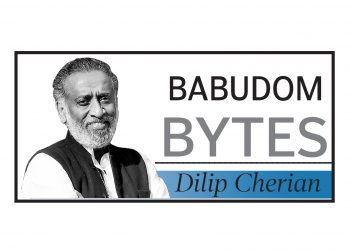As noted in an earlier column, there is a degree of discontent among Haryana babus over what many consider is a consistent attempt by the Manohar Khattar government in the state to allow the ‘usurping’ of IAS cadre posts by other services. The Haryana government has appointed several IPS, IFS and IRS officers to the cadre posts of the IAS.
Now Haryana IAS officer and well-known whistleblower Ashok Khemka has entered the fray with his take on the issue. Not known to mince words, which has often landed him in trouble, Khemka has reportedly written to Chief Secretary Vijai Vardhan and demanded that such cases should be referred to the Centre for consideration.
Those in the know say that in his letter the IAS officer pointed out that the IAS cadre rules stipulated that a non-cadre officer may be appointed temporarily (maximum three months) to a cadre post if no suitable cadre officer is available. For continuing an officer for a longer period requires prior approval of the Centre. He urged Vardhan to refer the cases of IPS, IRS and IFS officers appointed on the cadre posts of IAS officers to the central government.
And Khemka is not a solitary voice, it turns out that he has now been joined by the Haryana Civil Service Association whose president Dr Vandana Disodia too has highlighted the issue. It is not going to die down.
Empanelment blues
The trend of reduced representation at the joint secretary level has got the ‘heaven born’ worried. But none are more worried than the 2003 batch of IAS officers whose wait for empanelment is getting inordinately prolonged even by the standards of the Modi sarkar.
Sources say that since August 2019 only one fresh round of 37 officers of the 2002 batch and 25 officers from previous batches have been empaneled as joint secretaries. But the 2003 batch officers continue to await their turn. Meanwhile, four fresh batches of IAS (from the early 1990s) have been empaneled as additional secretaries and two batches (1987 and 1988) have been empaneled as secretaries.
Further, only 17 per cent of the empaneled officers are from the IAS, with the lion’s share going to non-IAS officers. This trend is likely to stay in the back of the minds of senior IAS officers even as the 2003 batch continues to hope that their empanelment happens sooner than later.
Clearing the air on vaccine
In October Prime Minister Narendra Modi had said the government was preparing to reach every single citizen with the Covid vaccine. In the run-up to the Bihar assembly elections, the BJP even promised free vaccine to the state’s voters in lieu of their support.
The election done and dusted; the government has now changed its stance. Union Health Secretary Rajesh Bhushan has ‘clarified’ that the government never spoke about vaccinating the entire country! He said that it is important that the discussion be based ‘only on factual information.’ Bhushan said that the average daily positivity rate in India is 3.72 per cent and India has the lowest number of cases per million count among all major countries, with 211 cases per million.
According to him, the government’s aim now is to vaccinate a critical mass of people and break the transmission of the virus, this not having to vaccinate the entire population, which by itself would be a challenging exercise. This ties in with the view of the World Health Organization (WHO) experts who say that 65 per cent – 70 per cent vaccine coverage rate is sufficient to reach herd immunity.
But the question is whether the voters of Bihar will get the vaccine first as promised in the BJP’s poll manifesto or was it just another jumla?
Share a babu experience! Follow dilipthecherian@twitter.com. Let’s multiply the effect.






































